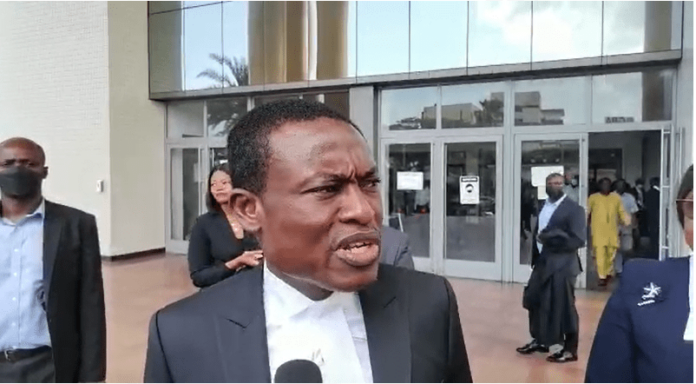The Office of the Special Prosecutor (OSP) is suspecting that some powers that be in the Judiciary have “gang-up against the flagship public anti-corruption agency to scuttle its work – for whatever reason.”
The OSP says in as much as he does not think anyone would deliberately work against it’s work, Mr. Agyebeng is making some suspicions considering what ensued in court regarding some cases that were under investigation at his outfit.
“However, there appears to be a developing trend of rather regressive and dismissive judicial decisions in respect of cases involving the OSP, with troubling consequences. And it seems to us that a careful examination of these outcomes portends a disturbing spectre that the fight against corruption is being hampered to the disbenefit of us all,” he stated.
Mr. Agyebeng listed four instances that have sufficed since he took over the mantle of office, making him make suspicions about possible deliberate mechanisms employed to frustrate its work.
“In one case, the OSP applied to the High Court for a confirmation of a freezing order in respect of a deceased person’s estate. The judge refused to confirm the order by, in effect, holding that the OSP had come too late since the person of interest had died and that his death had extinguished the enquiry commenced after the occurrence of death.
“The danger of this outcome is obvious. It is to effect that a person may, in his lifetime, acquire property through corruption and then upon his demise happily pass on the corruptly acquired property to his estate and by so doing, extinguish all scrutiny as to the propriety or otherwise of the acquisition of the property because his corrupt activities were not discovered during his lifetime.
“In the second instance, the OSP declared as wanted a person it believed to be a fugitive from justice. The person, through his lawyer, proceeded to the Human Rights Court on an ex parte application and the judge, without even an enquiry as to why the OSP believed him to be a fugitive from justice, issued an injunction order that the OSP should not arrest him for a period of ten days.
“Again, the danger of this outcome is obvious. It encourages criminal suspects to go before the courts to seek injunction orders against law enforcement agencies from apprehending them. The judge did not advert his mind to the well-founded proposition that no one has the right not to be arrested. And he accorded the suspect a right not to be arrested.
“In the third instance, the OSP applied to the High Court for a confirmation of a seizure order and a freezing order in respect of a person who had just resigned from a ministerial position and had reported that large cash sums in foreign denominations had been stolen from her residence. In addition, the OSP subsequently discovered additional large cash sums in foreign denominations and cedis still stashed in her residence.
“The judge hastily dismissed the OSP’s application and ordered a return of the seized amounts and the defreezing of her property and he proceeded to lash out at the OSP for not doing a thorough investigation – without the slightest consideration that the seizure and freezing orders are designed by law to facilitate investigation into the affairs of suspects and not the other way of requiring thorough investigation before the OSP can seize or freeze.
“The judge also completely shut ignored the fact that in almost every jurisdiction, including Ghana, it is extremely unusual and highly suspicious for a public officer to have such large cash sums stashed in their homes. And that that circumstances of the case dictated pause and reflection and the granting of the OSP adequate time to carry out its investigation. The judge was only interested in a return of the money to the person of interest and nothing more and he proceeded to erect non-existent legal barriers to prevent the OSP from investigating the matter.
“In the fourth instance, the OSP had issued an investigation report in respect of the grant of a customs advance ruling by the Customs Division of Ghana Revenue Authority. The report opined that there was an institutionalised culture of lighthearted unconcern regarding impropriety of action at the Customs Division of Ghana Revenue Authority – which indicated a high propensity to engender corruption and corruption-related activities. Consequently, the Special Prosecutor directed the opening of a wider investigation in respect of the affairs of the Customs Division.
“Further, in pursuance of the Office’s mandate of taking steps to prevent corruption, the Special Prosecutor directed remedial action by Ghana Revenue Authority. The Authority has instituted processes on the basis of the directive, which has saved the nation substantial revenue.
“The affected customs officials proceeded to the High Court to challenge the work of the OSP. The judge accused the OSP of constituting itself into a court and a commission of enquiry by making findings. In doing so, the judge conveniently shut his eyes to an express statutory provision that the OSP has the mandate to publish detected acts of corruption and that was exactly what the OSP had done in the report.
“Worse, the judge then proceeded to prohibit the OSP from further investigating the affected persons. The judge fell into the grievous fault of what he accused the OSP of – by outlandishly going beyond his jurisdiction with a purported clothing of the affected persons with immunity from investigation and hence immunity from prosecution.”
READ ALSO: National Cathedral Secretariat debunks criminality, corruption allegations about project













